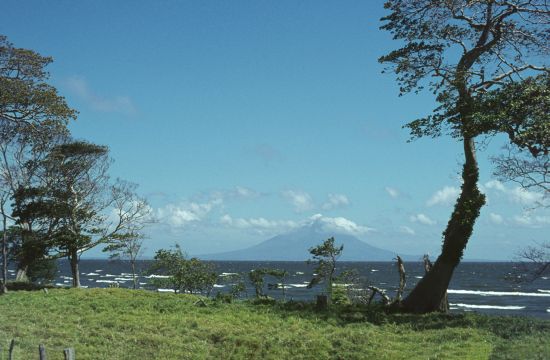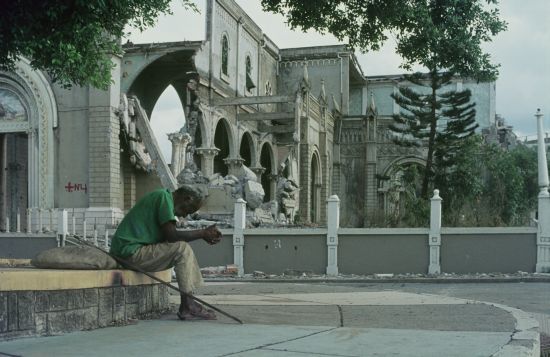| Barelds - Cycling around the world - Cycle stories - Asia, Africa, Europe, America | ||||||||||||||||||||
| home | site map | world | children | recent | cooking | dutch | german | react | ||||||||||||
Central and North America (3).

Nicaragua: An enormous inland sea and as everywhere dominated by volcanoes with a prefect conical shape.
A
bove the cauliflower, to which the jungle resembles when you look at it from the air - we breathed a sigh of relief. Just before Panama-city they were busy with the road southward, what a pity what a pity that it was not yet ready. When you can cycle you don't have any problems, that had become clear to us once again!H"ave you got your bicycles back again", people asked us friendly. "Again? What do you mean, we never lost them" They looked at us in surprise. "Aren't you the cyclists from the paper then?" Now, north of the "Darien Gap", that stretch of jungle without roads, which we had bridged with so much trouble, obviously there were more cyclists on route. Two members of a group who called themselves "Hemistour" had their bicycle stolen. They were on their way from Alaska to "Tierra del Fuego", to stimulate cycling, which was in those days an almost unknown form of moving in the US. With a lot of publicity, as it befits a true American. Or that Canadian. We met him on a humid warm jungle-like stretch. He dismounted, and filled his bidon from a rivulet that seeped from the mountains and he told us: "At a certain moment I thought, I am over 50, and soon I will be dead and I have still nothing seen of the world". He took a gulp, wiped the sweat from his face, "then I bought a bicycle, said good bey to my house and job and it pleases me very well".!"
The countries now followed one another quickly, as we got used to spending weeks in one country, it was strange that already after a week, we stood at a new border. Panama, Costa Rica, Nicaragua, Honduras, Guatemala, Belize was our route.

Nicaragua: the capital still in ruins after the devastating earthquake, the inhabitants are still partly in shock."
Through the dense coffee plantations we descended to Managua, Nicaragua's capital, we wanted to go to the postoffice, to post letters and films. The suburbs were hastily constructed barracks, the centre was completely knocked down. So this was it. Strangely enough, between the macabre remnants of houses and buildings, the Post office, cracked and supported, was still serving. Otherwise a totally deserted town, and under rubbish heaps, there must have lain some corpses, nobody lived there anymore. We cycled on and far outside the city we put up our tent by a river.
Our great comfort in the hot season in Central-America - we were in the wrong season - were the rivers, which we fortunately crossed regularly; coolness and water supply. Henny put up the tent and I cooked our meal, I wanted to make a festive meal, because it was my birthday, but I did not get further than kidney beans and rice, because Nicaragua had little to offer and on top of it, the beans were not done. The only comfort was the chocolate cake which I was able to prepare from the leftovers from our stock from Costa Rica, with cacao, fat and biscuits. Several horsemen waded very near to us, through the river: with their eternal hat and the long girdled machetes, children hung on lianas and plunged into the river and kept us pleasant company for a while. A woman walked past: "Always fetching water from the river", she grumbled.
In Honduras we bent away from the Pan Americana, in Guatemala we entered the jungle, recently opened up by a narrow sand road. The jungle formed a hugh wall along us and there was not a wind stirring, the road was white of the chalk like rock, (the soil consists of here) and glared in the bright sunlight. Henny was seized by it and lay down, sprawled, on the road in the shade. "I will never move any further" he moaned. At a river with very muddy sides he scooped some water from the fast flowing, clear, centre, but he did not go into it without a stick: further back we had seen a dead alligator, and it was quite possible that there was a live one here.
| Start World around | Central and North America | << Previous | Next page >> | |||
| Barelds on bicycle through the world - Cycling in Asia, Europe, Africa, America | ||||||